Europe and the US: married with children
Adelina Marini, April 14, 2010
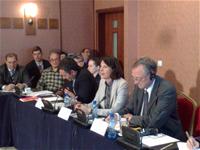 Should we divorce a partner whom we don't love anymore, with whom we even don't look in the same direction but still we feel safe with him or, more precisely, provided for by him? And is this the way we should analyse Transatlantic relations instead of the old way of the 20th century, when it was still modern Europe to be in the role of the parent and the US - of the child which took off on its own way? These thoughts burst into my head while I was listening to the discussion on the latest publication of Nick Witney and Jeremy Shapiro from the European Council for Foreign Relations, entitled "Towards a Post-American Europe: A Power Audit of EU-US Relations".
Should we divorce a partner whom we don't love anymore, with whom we even don't look in the same direction but still we feel safe with him or, more precisely, provided for by him? And is this the way we should analyse Transatlantic relations instead of the old way of the 20th century, when it was still modern Europe to be in the role of the parent and the US - of the child which took off on its own way? These thoughts burst into my head while I was listening to the discussion on the latest publication of Nick Witney and Jeremy Shapiro from the European Council for Foreign Relations, entitled "Towards a Post-American Europe: A Power Audit of EU-US Relations".
In fact the discussion, no matter how serious it was and how timely, constantly dragged toward marriage associations. First to make such a comparison was Nick Witney, who explained that one of the basic problems between the EU and the US was very much similar to family problems when partners get cooler toward to each other. He said that Europe, obviously, had not yet understood that with each action or inaction of its, it constantly caused disappointment in America, and America for a long time had not wanted to be a patron of Europe any longer but a partner, which "in good and evil" would always be by its side.
The EU just can't manage to respond adequately to the American expectations neither to accommodate Guantanamo prisoners, nor to contribute more in Afghanistan. Instead, some form of fetishism appeared among European leaders who compete with each other who spent more time with president Barack Obama. According to Mr Witney, the time has come for the EU to select a new approach towards Washington before it's too late. The current approach is based upon the realities of the past century which prevents a more realistic estimation of the present, the author of the report thinks.
In their analysis of the cooling of the transatlantic relations, Jeremy Shapiro and Nick Witney have paid special attention to the dividing line "new-old" Europe. According to Nick Witney old Europe is still submitted to its gratitude for America's help during and after the World War II. New Europe also has a lot of reasons to be grateful to the United States - for boosting the transition toward democracy and market economy, for stimulating freedom and, most of all - for Europe's unification.
By the way, it is about this axis that the Bulgarian foreign minister Nikolay Mladenov gave a very reasonable explanation. He said that the tension between the US and Europe was due to "the complex of the old colonial states which have their own vision about their responsibility toward that part of the world they ruled in the past and the post-Soviet complex of Eastern Europe".
Unwillingly Mr Mladenov also succumbed to the metaphor with the marriage during the discussion, which provoked euinside to ask whether we, within Europe, have had it clear for ourselves the issue of who married who. And if we continue with the family terminology, we can safely say that new Europe divorced the Soviet Union and chose old Europe as its second husband, while in the same time it was trying to secure its partnership with the US in case of a need.
The Bulgarian foreign minister agreed and then seriously explained: "It will not be a lie if we say that, after all, we married the old EU member states. However, this does not mean that life from now on - theirs and ours - will stay the same as it was before the wedding. Because the fear not to be able to come up with a common thesis, not to be able to speak out loud about the common thesis in a way that it can be heard all over the world, is also a systemic fear - the economic situation, the political one, the problems which are different for all member states and the compromise that has to be found between all these policies which often leads to the least common multiple".
As a proof that there is still not enough clarity how the roles in the global family are distributed, was another question which put Central and Eastern Europe in the role of a child being the result of the marriage between the EU and the US.
Although it might sound quite far from serious, the family discourse has its background, which has been influencing the Euro-Atlantic relations so far. With the very creation of the United States of America Europe has always considered America as a child of its own that left home. Now the child is a grown up and wants specific things from its parents and if it does not get them, it starts looking for them elsewhere.
According to the participants in the discussion, not everything is lost. 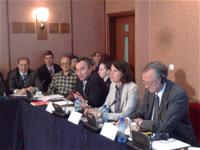 Furthermore, they expressed optimism that the creation of the new European External Action Service (EEAS), envisaged in the Lisbon Treaty, the EU will finally manage to speak with a single voice to the world and also - will be able to better formulate its own interests. In order for the project to be successful, though, according to Nikolay Mladenov, Europe's voice - the High Representative for Foreign Affairs baroness Catherine Ashton - should surround herself with enough people who are very well aware of all the historical, religious and political peculiarities of the 27 EU member states, because this would give her the liberty to speak on their behalf.
Furthermore, they expressed optimism that the creation of the new European External Action Service (EEAS), envisaged in the Lisbon Treaty, the EU will finally manage to speak with a single voice to the world and also - will be able to better formulate its own interests. In order for the project to be successful, though, according to Nikolay Mladenov, Europe's voice - the High Representative for Foreign Affairs baroness Catherine Ashton - should surround herself with enough people who are very well aware of all the historical, religious and political peculiarities of the 27 EU member states, because this would give her the liberty to speak on their behalf.
And although striking of balance to be a little bit late at this point, given the speed with which the global landscape is changing and the speed with which the EU can adapt because of its institutional sluggishness, this conversation has to happen. Because it is true that within the EU we are not equal in many aspects, but it is also true that if we constantly form our approach to the world on the basis of "the old members know better and the new ones should only listen and follow", this certainly makes it easier for those for whom a "pragmatic" approach is the only one possible. And "pragmatic" is the modern interpretation of "divide and rule". This can clearly be seen in EU's approach toward Russia.
It can also be seen in the reactions to the meeting in Prague of president Barack Obama with Central and Eastern Europe leaders, to which EU or NATO representatives were not invited. According to some, this was a summit with which the American president wanted to clearly show to the new EU member states that America had not abandoned them. Nikolay Mladenov saw this in a different way: "I am not worried currently that Obama met some leaders in Prague, that not all NATO or EU member states were invited, because those who were shared common history, common sensitivity. It is real. Why do we have to pretend that it does not exist? Why should we try to hide it? Let us find a solution together with the European institutions".
Maybe the refusal of president Barack Obama to attend the regular EU-US summit in Europe was not the best occasion for Europe to finally start thinking what happened in the last 10 years, when the Union was trying to find itself but after all, as the saying goes - better later than never. And regarding Bulgaria - it is good that we have a minister for foreign affairs who speaks that open and is very well informed on such issues. Next thing is for him to show that new member states are not meant only to follow but also to form foreign policy, no matter that they are still poor and under reformed.
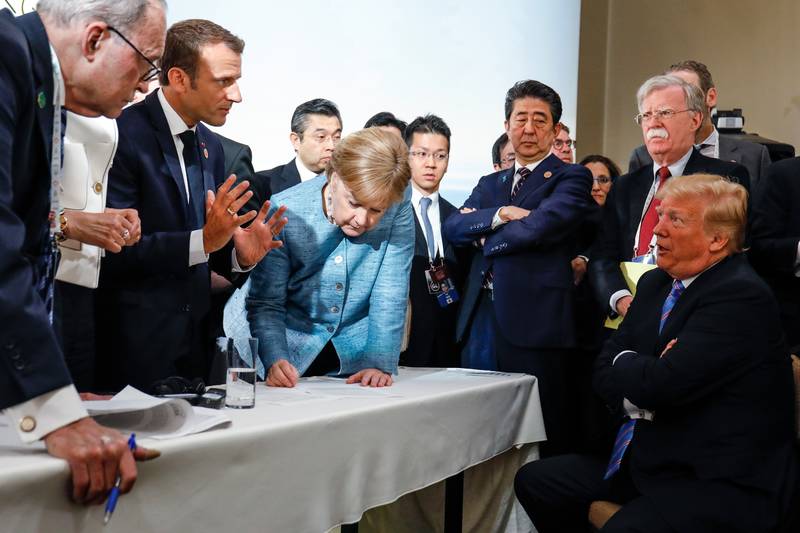 Macron, Merkel, Abe, Trump | © Council of the EU
Macron, Merkel, Abe, Trump | © Council of the EU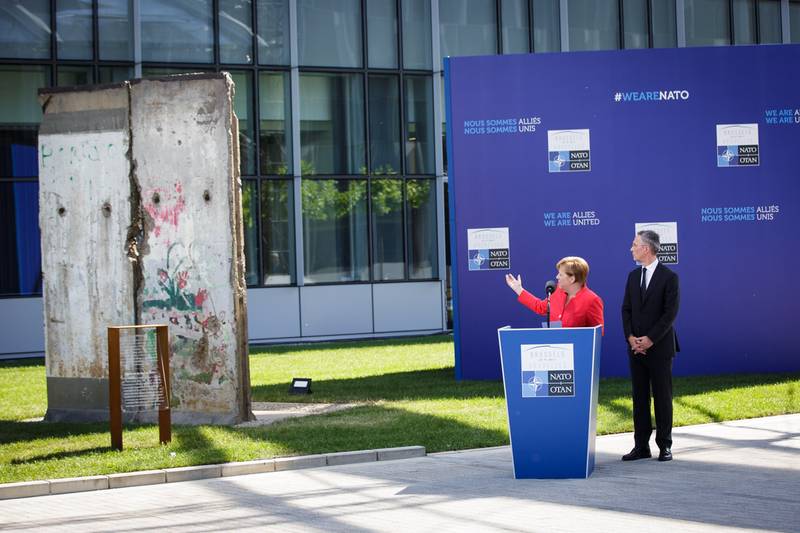 Angela Merkel | © Bundesregierung
Angela Merkel | © Bundesregierung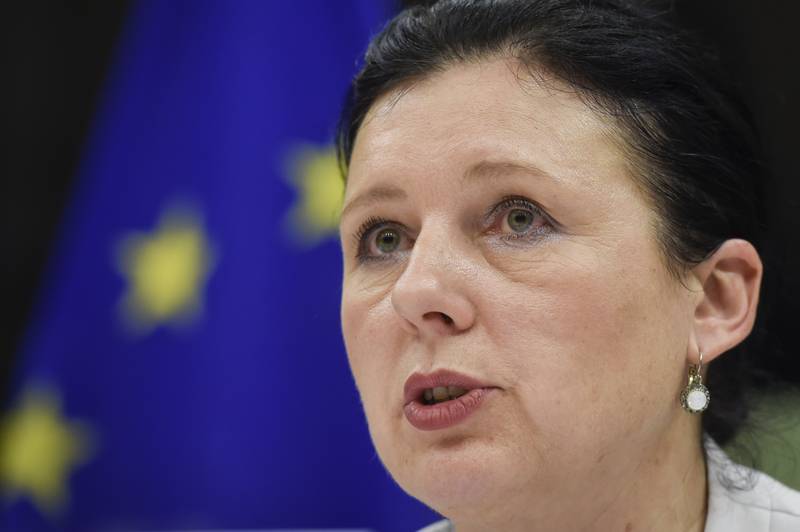 Vera Jourova | © European Parliament
Vera Jourova | © European Parliament